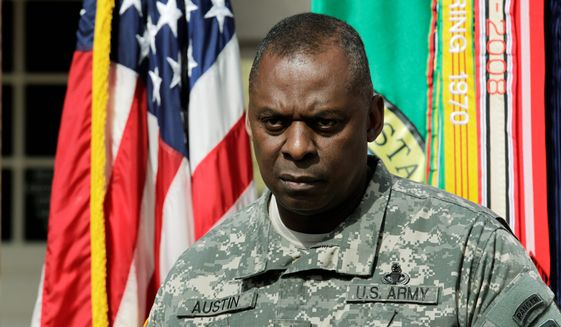The departure of U.S. personnel from Yemen has exacerbated the deteriorating relationship between the two countries and undercut a joint effort to fight Islamist terrorists, according to a U.S. four-star general.
Yemen has been a key U.S. ally in fighting against al Qaeda in the Arabian Peninsula — also known as AQAP — but that could soon change, said Army Gen. Lloyd Austin, commander of U.S. Central Command, who oversees military operations in the Middle East. He testified Tuesday before Congress.
The collapse of Yemen’s U.S.-backed government this year from an uprising by Houthi rebels and the resulting evacuation of U.S. personnel from the country has sparked a “significant and growing concern” that Yemen “remains on a negative trajectory,” said Gen. Austin.
Pentagon officials have found it “exceedingly difficult” for the U.S. government to use spy planes to track and terminate al Qaeda members because the Yemeni government has “generally curtailed” its counterterrorism operations, which has let AQAP regain territory and increase activities, the general said in his testimony.
This is the first time the four-star general has formally disclosed to lawmakers his concerns about how the removal of pertinent State Department and military staff from a country have further inflamed concerns about the future of counterterrorism operations in the region.
“We must figure out how to maintain our [counterterrorism] platform in Yemen in order to counter the threat from AQAP,” he said.
Rep. Mac Thornberry, Texas Republican and chairman of the powerful House Armed Services Committee, told The Washington Times that the U.S. departure from Yemen has “significantly harmed” U.S. counterterrorism operations in the country.
“We don’t have very many good options right now,” he said. “We don’t have a government to work with. The point is — this is going worse, not better, and it was held up as the model of what we wanted to do elsewhere.”
The capital of Yemen is controlled by northern-based Shiite Houthi militias, and the south of the country is being held by President Abdu Rabu Mansour Hadi, who is trying to establish his own power base through a variety of tribes and militias.
Overall, the country is teetering on a verge of collapse, as U.N. political negotiations aimed at brokering a resolution seem to be getting nowhere. The Iran-backed Houthi minority dislikes Sunni-dominated AQAP but also doesn’t trust the U.S.
Defense Secretary Ashton Carter assured senators that the U.S. military has been working with the State Department to preserve what it can of the “critically important” Yemen operation.
“We’re doing everything we can to combat AQAP in the face of what is going on with the Houthis and in the government of Sanaa,” Mr. Carter said during a March 3 Senate Armed Services Committee hearing.
As the U.S. continues to pursue drone attacks on al Qaeda operatives living in the region, security analysts question its overall success for stability in the region in the long run.
“When it comes down to dealing with counterterrorism you may, on occasion, be able to target some significant figures, but you’re not going to be able to suppress al Qaeda in the Arabian Peninsula simply by striking a few leaders,” said Anthony Cordesman, strategy chairman at the Center for Strategic and International Studies and the Pentagon’s former director of intelligence assessment. “And your ability to target those leaders will be effective but lack the human intelligence and forward support you’ve had in the past. There is no short-term indication that you have a good, stable solution to counterterrorism in Yemen.”
